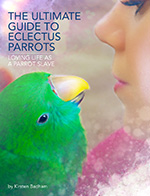Dietary Supplements
Vitamin A
I have spoken with many aviculturists over the years and all have noted that Eclectus require a higher level of vitamin A than other parrot species. We observe that they instinctively eat Vitamin A rich foods first before moving on to enjoy the rest of their meal. As their carers we need to ensure that we provide this in their daily diet. Orange, red and yellow vegetables and fruits such as sweet potato, carrots, apricot, red peppers, kale or cantaloupe are a great source of vitamin A. Egg yolk is also high in vitamin A.
I prefer to provide a natural diet rich in vitamin A and use man-made supplements as little as possible to prevent over-supplementing. When offering synthetic supplements, ensure that you follow manufacturers directions and if you have any questions, seek the advice of your avian vet.
Over supplementing
Eclectus parrots have a longer digestive tract than other parrot species. This causes parrots to absorb higher levels of vitamins and minerals. This does not occur with natural foods such as fruit and vegetables. However an Eclectus that is regularly provided with synthetic supplements is prone to over-supplementing or vitamin toxicity. This can lead to physical and emotional issues such as toe tapping, feather plucking, wing flipping, and screaming, or vitamin toxicity.
Synthetic supplements certainly play an important role in maintaining the health and wellbeing of our parrots, yet they must always be used in moderation. Nothing beats fresh natural foods and the more variety we can provide, the less likely the need for supplements.
If you choose to use synthetic supplements, please seek the advice of an avian vet who has experience with Eclectus parrots.
Calcium requirements
Calcium is an essential part of our parrots diet. It helps keep bones dense and strong and assists in nerve and muscle formation. All parrots need calcium but it is especially important for mature hens and young developing parrots.
Low calcium levels in a laying hen can result in:
- Poorly formed or misshapen eggs
- Thin eggshells
- Muscle weakness and weakened bones
- Egg binding (potentially deadly)
Low calcium levels in neonate and young chicks can result in issues such as:
- Splayed legs
- Skeletal deformities (such as Rickets - where the bones bend under the weight of the baby as they grow)
- Weakened muscles
- Stunted growth
- Weak bones
- Beak deformities

There is a great deal to learn about the Eclectus diet. Our book 'The Ultimate Guide to Eclectus Parrots' provides extensive information about the nutritional requirements of the Eclectus parrot.
This chapter includes information on:
- The Eckie appetite
- Food ratios
- Obesity
- The importance of vitamin A
- Over supplementing
- Dangers of low calcium levels
- Pellets
- Special molting diet
- Egg and biscuit recipes
- And many more topics!